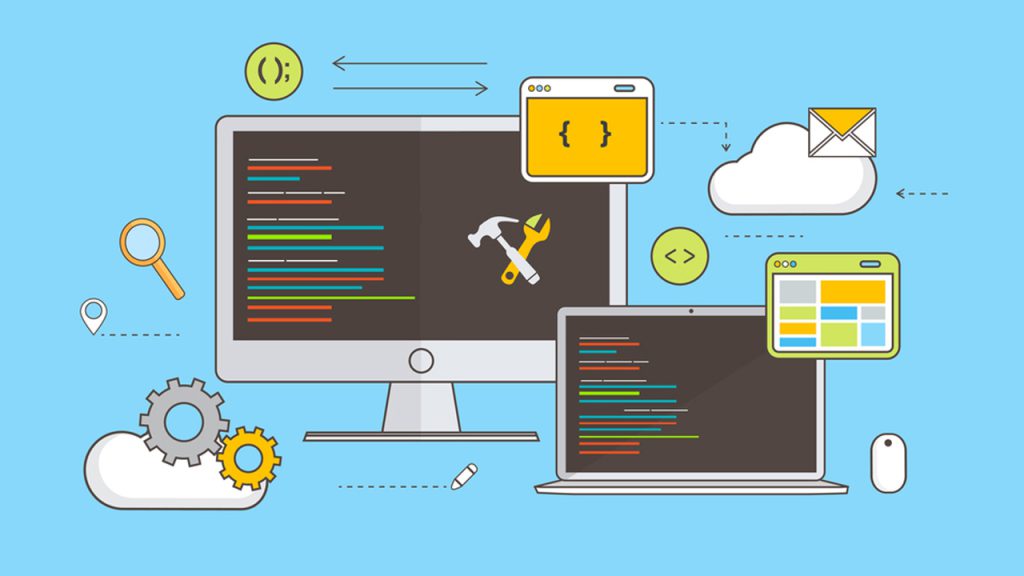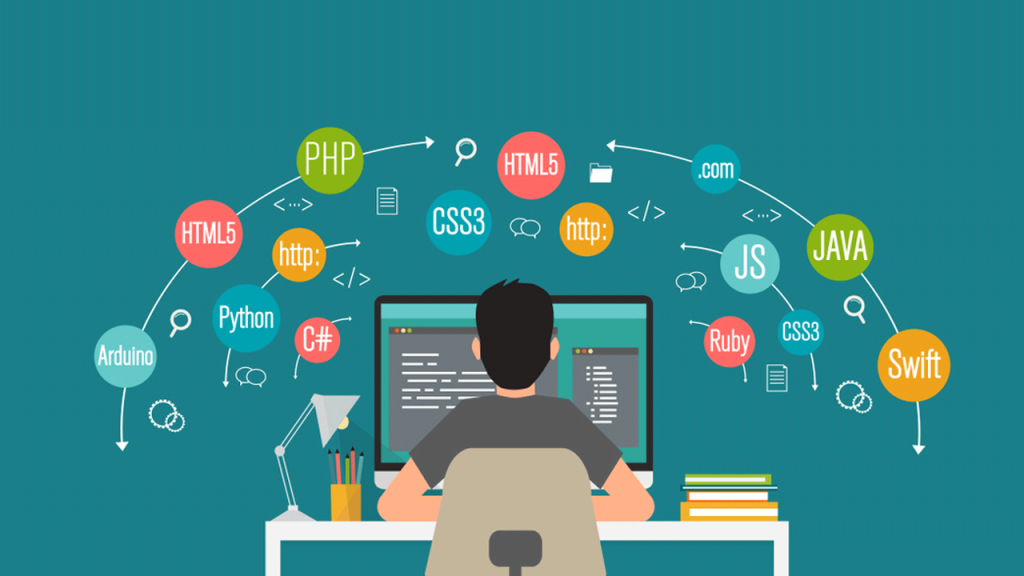In this article, we discuss how to learn programming? Contrary to what you might think, learning to program quickly and becoming a programmer does not require an expensive system with several large monitors or a dark basement full of tangled wires. In fact, most of the programming requirements are within you. This article will show you precisely what you need to start programming and what you should know.
Programming prerequisite
Before learning to program, you should develop a series of abilities and familiarize yourself with the prerequisites of programming. Learning these abilities will help you master your desired programming language sooner and get answers to your questions more easily. In the following, we introduce these prerequisites to you.
Goal setting and motivation for programming
The first and most important prerequisite for programming is to have a goal! Before starting programming, you should be able to answer this question: ” How to start programming?” If you can answer this question clearly, then you can proceed to the next steps. Answering this question is important because it can be the beginning of your step into a big world. In programming, you often come across complex issues or problems that sometimes require you to spend hours and days solving them, and this is a situation that sometimes requires love to tolerate!

Familiarity with algorithms
In order for a computer to do a task, you have to write a computer program. To write a computer program, you have to tell the computer exactly what you want it to do step by step. Then it’s up to the computer to do everything. However, the only problem is how to get these precise and step-by-step instructions, and how should the computer do these things? This is where the algorithm comes in! For example, in the algorithm of adding two numbers, we need to act as follows:
- Take the number a
- Take the number b
- Put a+b in c
- Display c
Now it is required to translate these step-by-step instructions, which are actually a kind of pseudocode, into the desired programming language. Algorithms are one of the main prerequisites for learning programming. So, it is definitely better to get familiar with algorithms and flowcharts before starting programming.
People who are familiar with algorithms and flowcharts know how to break a large problem into small parts and then into steps that a computer can understand. This means that when you are faced with a problem, you can imagine how the computer can solve the problem, and you almost know where to start. Also, regardless of the type of programming language, you know how to transfer the way you have in mind to solve the problem to the computer.
Mathematics
To make the right decisions in programming and write conditionals and loops with correct logic, you need to know mathematics. But we cannot say that you need complex mathematical concepts such as integral, differential, etc. Usually, the only mathematics you need in programming is boolean logic and some probability. Check this article about some misconceptions that will stop you from learning programming?
Without knowing the science of logic, understanding the nested conditions in programming and writing a logical process for the program algorithm gets difficult and time-consuming.
Typing skills
You must have seen people who type on the computer while pointing their index fingers toward the keyboard and pressing a key almost every thirty seconds. Now suppose they write a program in this boring situation!
Therefore, it is better to strengthen your typing skill and to use both hands before starting coding seriously. If you don’t have this skill, you shouldn’t worry because, usually, over time, your typing skill will become stronger.
Familiarity with the Internet
To get answers to your questions, you need to refer to programming forums such as StackOverflow. So, you need to be able to use the Internet. Of course, this need becomes even stronger if you choose web programming. For web programming, you need to go beyond familiarity and get to know the basic concepts of the web and networks to some extent.
What do we need to learn programming?
Before learning programming, you need a series of tools. But don’t worry because all these tools are easily available, or even you already have them. In the following, we introduce the list of things you need to start.

- Computer and operating system: You need a computer to write computer programs, compile and run them, and a computer without an operating system is nothing but a corpse!
- Internet: Your programming choice may not be web languages, but you may always encounter problems and need help. You should be able to search the internet for your problem or ask it on forums like StackOverflow.
- Browser: To search the Internet or read related articles, you need a browser such as Chrome or Firefox. If you intend to enter the web programming field, you must be able to run and test your programs on a browser.
- Text editor: To be able to write simple codes on the computer, having a text editor seems almost enough. Operating systems usually have a text editor by default. For example, Windows has a notepad text editor, Linux has Vim, and Macintosh has TextEdit.
- Compiler: Your software must be translated into machine language from a high-level language close to human language, and compilers do this. If you use an IDE for programming, that IDE usually has a compiler, but if you use a text editor for programming, you must use a compiler separately.
- IDE: After programming languages became more complex, IDEs gradually entered the programming field. IDE stands for Integrated Development Environment. Advanced IDEs make programming easier in many ways. They can have code guides, code testing and debugging tools, and compilers. For example, you can use “NetBeans” IDE for Java programming, “Android Studio” for Android programming, and “PHPStorm” for PHP programming.
How to improve in programming?
Becoming a programmer, regardless of any subject, is a category that no one enters unless there is interest and love for it. On the other hand, if someone enters the programming field without enough interest, they definitely face big challenges, all of which make them lose the perseverance and effort to progress.
It is obvious that every person seeks to reach the highest level in the field and subject they are interested in, and they do not stop trying until this is achieved for them. Continue your way with double strength and motivation. For example, consider a soccer player trying daily to play in more professional teams and leagues and never gets tired of the hard training he does to achieve his goals.
The most important concern of a programmer has always been how to become a better programmer, or in other words, how to become the best version of themselves in programming. One of the best ways to answer this question is to benefit from the experience of successful programmers, which can be examined from two different perspectives.
First, let’s see what mistakes programmers often make and how they deal with those issues. By doing this, we can learn from these common mistakes so that we don’t make these mistakes on our way or know how to deal with these issues. Second, let’s see what others have done in the way of reaching the peaks of programming and start doing them.
In this section, we will examine and explain the first case in full. We first get to know the common mistakes among programmers, and then I will deal with the second case in a separate article so that we know what we should do in this direction to become a professional programmer.
1. Not interested in programming

The first and biggest mistake a person makes is entering a field they are not interested in. You may have seen many people who change their work and jump from one branch to another because of their social status or earning a better income. But don’t get me wrong, programming is a skill that requires time and perseverance to learn and strengthen, and these things will not be possible for you without having enough interest.
A person interested in programming thinks about programming every day from when they wake up until sleeping time. Even when they sleep, they gather all their senses and concentration to find the best solution for their programs. For a person who loves programming, every day they go to work is a great but not painful day that they were forced to go to work. This person always sees programming as an enjoyable pastime rather than just a job to earn money and make a living.
2. Disappointment

One of the problems that will always accompany you at the beginning of this path is a feeling of despair. Everyone will experience this feeling at the beginning of their work and especially when facing various issues and problems. Everyone knows that a programmer always deals with complex issues and questions, and programming is not just writing code in a programming language but providing a solution that is implemented by writing the code of that language.
It is obvious that if you know the solutions to problems in this way, you will face them easily, but when you encounter new challenges, you may be disappointed. But the key thing in programming is to be patient and not get frustrated because you have to concentrate on finding the optimal solution and know that you will finally get the answer to your problem.
For this, you have to strengthen your challenging spirit day by day. For this purpose, always involve yourself in new challenges and issues so you can strengthen yourself by solving new and complex issues, in addition to gaining experience and skills.
3. Not documenting your experiences and findings

Usually, all the programmers who start learning a programming language or come across a new point while coding says to themselves: “I must have learned and remembered it” But this is one of the common mistakes among programmers, especially new programmers.
I have always seen many people who, when they are learning a programming language or looking to find a solution to a challenge, believe that by hearing, reading, or finding new solutions which have learned them completely, have refused to take notes by trusting their memory. But with the passing of time, as soon as they face those cases again, they realize they cannot implement and solve them. Because it is obvious that a programmer deals with many challenges every day, and mastering these issues requires a lot of time and experience.
Therefore, always try to note down and document all your points and findings at the beginning of your work, and ensure to use comments for your codes until this becomes a habit for you. In addition to creating a suitable resource for yourself, you can share it with others and help their learning process.
4. Not being critical and not having the spirit of teamwork

Programmers who consider the development path accept that one of the fastest and the most reliable ways to progress and learn programming is to accept criticism and use the experiences of successful and more experienced programmers.
The members of a programming team are exactly like the members of a football team, and each person has their own duties to perform. On the other hand, the way each person performs their duties affects the entire team. For this reason, a programmer should always try to synchronize themselves with their team, and if they need help, they should recklessly use the help of other team members.
Because programming does not have a single and unique path, programmers are always involved in the development of software with many and various decisions to be able to choose the optimal solution. Therefore, successful programmers are always looking for the opinions of other programmers about the performance of their software to improve their code.
5. Dirty coding

One of the signs of a professional programmer is that their code is not dirty. Maybe some people do not pay attention to this very important point at first and focuse on the correct implementation of their final software. However, avoiding dirty code writing has become one of the criteria that companies and programming teams have to hire a programmer.
Therefore, you should always pay attention to this point, especially in teamwork, that we should write code for humans and not for computers because a professional programmer writes their code in an understandable and commented way and is always trying to use the best and most understandable names in their code. Of course, pay attention to the point that we should not be so involved in optimizing our code that it becomes an obsession.
6. Failure to strengthen soft skills

Soft skills are the set of individual characteristics of a person including controlling anxiety, being patient, etc. You may have wondered what relationship between characteristics like patience or having good manners is with programming and how these characteristics can be used in your profession. Since you are going to work in a programming team or even if you are working as a freelancer, you need to interact with people, and you must be able to communicate with them properly. When you join a programming team, you should look at them as a family because you are going to spend at least half of your day with them, facing challenges with each other. So always try to strengthen your relationships and communication skills.
7. Not being flexible to change

Flexibility is considered as one of the most important characteristics of a programmer because they are considered a professional programmer who is always ready to choose the best language, framework, and tool when needed according to their task. Therefore, instead of always relying on a specific method, language or tool, try always to be up to date and familiar with other technologies.
Becoming a programmer is not just about learning a programming language. You must master its concepts and principles. Therefore, you may need to change your programming language in the middle and learn new things. Technologies are progressing and changing day by day, and you must always choose the best tools, methods, and programming languages. In other words, the final result of the work should not be sacrificed due to lack of knowledge.
How to learn programming so as not to fail?
We certainly encounter various challenges and mistakes on the way to becoming a professional programmer, which are different from one person to another. But there are some mistakes and weaknesses more or less for all programmers, especially programmers who have just entered the programming field. If you have encountered other problems in your programming path that you think have been overlooked and can help other programming enthusiasts, be sure to comment them at the bottom of this post so they can be added to the above.



